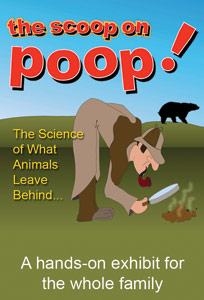A newish trend in parenting circles is "elimination control," a controversial technique whereby an infant's primary caretaker is supposed to learn to read his facial cues when pooping becomes imminent and then dangle the baby over the toilet, letting him do his thing unfettered. I've only met one mother who had any success with the method. However, E.C.'s main tenet – that diapers are unnatural – gives its practitioners (and guinea pigs) an interesting link to the animal world.

Oh, that it were socially permissible to teach our human young to poop in the wild. Birds do it. Bees do it. Bears do it. And they don't need sticker charts, new matchbox cars or the promise of Reese's Pieces to accomplish the inevitable.
Although thoroughly pee-trained for at least six months, my 3-year-old refused to let loose a no. 2 in the civilly sanctioned receptacle (i.e., the potty). When he felt something major coming on, he begged for a disposable "pull-up," and wouldn't be coaxed to dump his latest load anywhere else. Astoundingly, he broke our stalemate and used the toilet while I happened to be on the phone with North Carolina Arboretum Exhibition Curator John Bubany, chatting about an upcoming show on nothing other than the embattled topic.
I yelped in glee and disbelief. Bubany, a soft-spoken and particularly understanding individual, offered me warm congratulations.
The Scoop on Poop! — which boasts the delightful marketing slogan "A Hands-On Exhibit for the Whole Family" — opens at the Arboretum on Friday, Jan. 22, and will be a welcome attraction for parents like me who missed The Health Adventure's thematically similar exhibit, Grossology, that closed earlier this month.
Bubany, who also did design work on Grossology, says that the art and science of defecation "is still a taboo topic" for humans — despite the fact that "every living thing poops in one way or another." Like a particularly satisfying bowel movement, Scoop has been in the works for quite a while and has traveled a long way to get here. It blends hard science with a wealth of video, brightly paneled displays and funny, interactive games. "Adults will learn something too," promises the curator. (The facts on dung beetles alone are eye-watering. And did you know that the white part of bird crap is actually urine?)
Visitors can step on a scale and see how long it might take an elephant to poop out their body weight, avail themselves of a unique photo opportunity involving the remnants of an outhouse, enter "Stool School" and try to identify authentic doo-doo versus phony feces, and exercise their noses at the best-left-to-the-imagination "Sniff Station."
Think litter boxes are stinky? "Reptiles," reveals Bubany, "have one of the smelliest farts there are. If one actually does it in the woods, you can tell." He's talking about rodent-ingesting reptiles, not herbivores. In general, animals with a high-protein diet release the more lurid loads.
"That's why dogs and cats are pretty odiferous," he adds, blaming the "oversaturated protein content" of commercial pet food. Another unfortunate byproduct, for pets, of living with people is that domesticated animals can be made to feel embarrassed by their stool.
"I have a friend whose dog is so ashamed of it that he won't poop if you're watching him," says Bubany. "Even on a trail, he will find a bush to do it in, and stop if you come up to him during the process. That's very humanlike behavior."
Walt Whitman revered wild animals because, according to him, "not one is respectable or unhappy over the whole earth." And indeed, in their world, elimination remains as natural as it was meant to be.
In some cases, it's even encoded for survival. "There's a major difference in how animals and people use poop," says Bubany. "Some insects," he reveals, "hide their babies in it."
OK — so maybe the differences aren't so major. Apparently it's not only human moms for whom offspring and elimination become intimately linked.
Amusingly, if not intentionally, the exhibit ends on Mother's Day.
Created by Peeling Productions at Clyde Peeling's Reptiland in Allenwood, Pa., The Scoop on Poop! The Science of What Animals Leave Behind is based on the eponymous book by Dr. Wayne Lynch. It opens Friday, Jan. 22, at the Baker Exhibit Center at the North Carolina Arboretum (100 Frederick Law Olmsted Way) and runs through Sunday, May 9. For hours, admission fees and more information, see www.ncarboretum.org or call 665-2492.
[Melanie McGee Bianchi is a stay-at-home mom and freelance journalist.]



Before you comment
The comments section is here to provide a platform for civil dialogue on the issues we face together as a local community. Xpress is committed to offering this platform for all voices, but when the tone of the discussion gets nasty or strays off topic, we believe many people choose not to participate. Xpress editors are determined to moderate comments to ensure a constructive interchange is maintained. All comments judged not to be in keeping with the spirit of civil discourse will be removed and repeat violators will be banned. See here for our terms of service. Thank you for being part of this effort to promote respectful discussion.